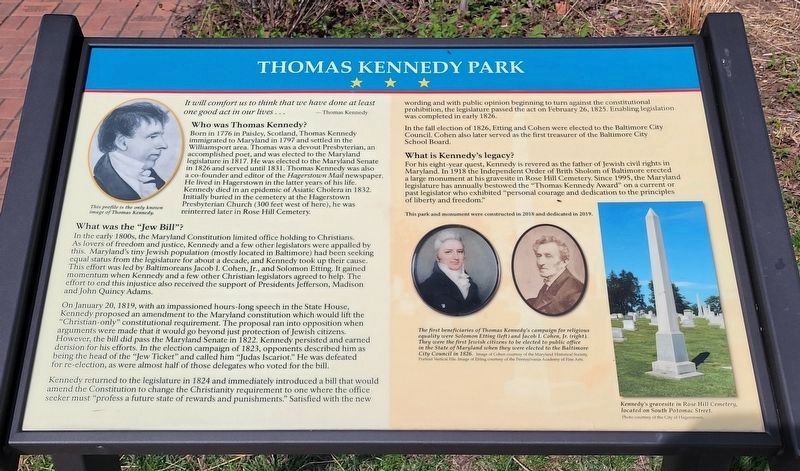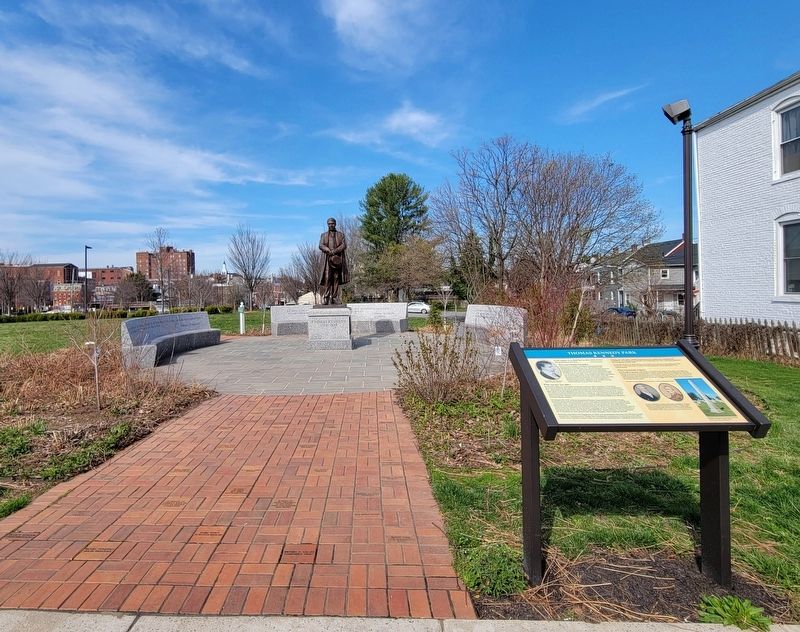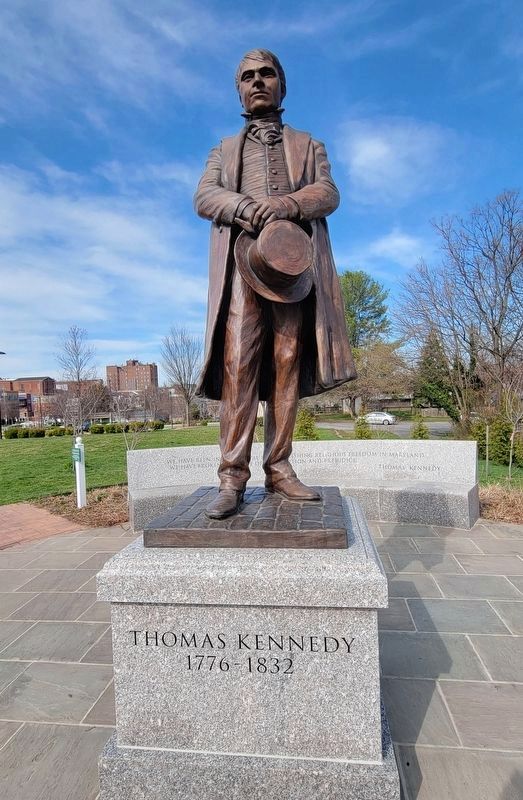Hagerstown in Washington County, Maryland — The American Northeast (Mid-Atlantic)
Thomas Kennedy Park
Who was Thomas Kennedy?
Born in 1776 in Paisley, Scotland, Thomas Kennedy immigrated to Maryland in 1797 and settled in the Williamsport area. Thomas was a devout Presbyterian, an accomplished poet, and was elected to the Maryland legislature in 1817. He was elected to the Maryland Senate in 1826 and served until 1831. Thomas Kennedy was also a co-founder and editor of the Hagerstown Mail newspaper. He lived in Hagerstown in the latter years of his life. Kennedy died in an epidemic of Asiatic Cholera in 1832. Initially buried in the cemetery at the Hagerstown Presbyterian Church (300 feet west of here), he was reinterred later in Rose Hill Cemetery.
What was the "Jew Bill"?
In the early 1800s, the Maryland Constitution limited office holding to Christians. As lovers of freedom and justice, Kennedy and a few other legislators were appalled by this. Maryland's tiny Jewish population (mostly located in Baltimore) had been seeking equal status from the legislature for about a decade, and Kennedy took up their cause. This effort was led by Baltimoreans Jacob I. Cohen, Jr., and Solomon Etting. It gained momentum when Kennedy and a few other Christian legislators agreed to help. The effort to end this injustice also received the support of Presidents Jefferson, Madison and John Quincy Adams.
On January 20, 1819, with an impassioned hours-long speech in the State House, Kennedy proposed an amendment to the Maryland constitution which would lift the "Christian-only" constitutional requirement. The proposal ran into opposition when arguments were made that it would go beyond just protection of Jewish citizens. However, the bill did pass the Maryland Senate in 1822. Kennedy persisted and earned derision for his efforts. In the election campaign of 1823, opponents described him as being the head of the "Jew Ticket" and called him "Judas Iscariot." He was defeated for re-election, as were almost half of those delegates who voted for the bill.
Kennedy returned to the legislature in 1824 and immediately introduced a bill that would amend the Constitution to change the Christianity requirement to one where the office seeker must "profess a future state of rewards and punishments." Satisfied with the new wording and with public opinion beginning to turn against the constitutional prohibition, the legislature passed the act on February 26, 1825. Enabling legislation was completed in early 1826.
In the fall election of 1826, Etting and Cohen were elected to the Baltimore City Council. Cohen also later served as the first treasurer of the Baltimore City School Board.
What is Kennedy's legacy?
For his eight-year quest, Kennedy is revered as the father of Jewish civil rights in Maryland. In 1918 the Independent Order of Brith Sholom of Baltimore erected a large monument at his gravesite in Rose Hill Cemetery. Since 1995, the Maryland legislature has annually bestowed the "Thomas Kennedy Award" on a current or past legislator who exhibited "personal courage and dedication to the principles of liberty and freedom."
This park and monument were constructed in 2018 and dedicated in 2019.
Captions:
This profile is the only known image of Thomas Kennedy.
The first beneficiaries of Thomas Kennedy's campaign for religious equality were Solomon Etting (left) and Jacob I. Cohen, Jr. (right). They were the first Jewish citizens to be elected to public office in the State of Maryland when they were elected to the Baltimore City Council in 1826. Image of Cohen courtesy of the Maryland Historical Society, Portrait Vertical File. Image of Etting courtesy of the Pennsylvania Academy of Fine Arts.
Kennedy's gravesite in Rose Hill Cemetery, located on South Potomac Street.
Photo courtesy of the City of Hagerstown.
Erected 2019 by City of Hagerstown.
Topics. This historical marker is listed in these topic lists: Churches & Religion • Government & Politics. A significant historical date for this entry is January 20, 1819.
Location. 39° 38.302′ N, 77° 43.233′ W. Marker is in Hagerstown, Maryland, in Washington County. Marker is on East Baltimore Street west of South Locust Street, on the right when traveling west. Marker is located in Thomas Kennedy Park. Touch for map. Marker is at or near this postal address: 50 East Baltimore Street, Hagerstown MD 21740, United States of America. Touch for directions.
Other nearby markers. At least 8 other markers are within walking distance of this marker. Thomas Kennedy (a few steps from this marker); Elliott-Bester House (about 600 feet away, measured in a direct line); Our Journey Transports Us Through Time (about 600 feet away); St Johns Episcopal Churchyard. (about 700 feet away); St. John's Cemetery (about 700 feet away); Retreat from Gettysburg (about 800 feet away); Hagerstonians in the Civil War (approx. 0.2 miles away); Hagerstown Female Seminary (approx. 0.2 miles away). Touch for a list and map of all markers in Hagerstown.
Also see . . . Thomas Kennedy: The Poet Who Loved Liberty and Led a Struggle for Religious Tolerance. Dan Guzy's well researched book on the life of Thomas Kennedy
Thomas Kennedy is best remembered and honored today as the leader of the effort that gave political rights to Jews in Maryland. That was just part of the rich and interesting life of this Scot who immigrated to American in 1797 and became a poet, bookkeeper, clerk, merchant, shipper, lawyer, justice, farmer, distiller, soldier, real estate agent, postmaster, newspaper editor and politician before dying in the cholera pandemic of 1832.(Submitted on August 18, 2022, by Jill Craig of Hagerstown, Maryland.)
Kennedy was a romantic who embraced the ideals of liberty and freedom that the United States promised but did not always deliver. This book details the struggles, heartbreaks, and triumphs of this prominent historical figure of Washington County, Maryland.
Credits. This page was last revised on August 22, 2022. It was originally submitted on April 14, 2022, by Bradley Owen of Morgantown, West Virginia. This page has been viewed 118 times since then and 18 times this year. Photos: 1, 2, 3. submitted on April 14, 2022, by Bradley Owen of Morgantown, West Virginia. • Bill Pfingsten was the editor who published this page.


